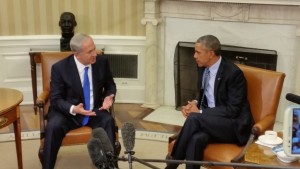After four years of getting “played” by Israeli Prime Minister Netanyahu, Secretary of State Kerry told some truths about Israel-Palestine that raised hackles among Netanyahu’s acolytes, as ex-CIA analyst Paul R. Pillar describes.
By Paul R. Pillar
Secretary of State John Kerry’s speech last week on the Israeli-Palestinian conflict is an excellent statement of the realities that are inescapable aspects of this conflict and that anyone who claims to deal with the dispute seriously must understand.

Secretary of State John Kerry and Israeli Prime Minister Benjamin Netanyahu. (State Department photo)
Most of those realities the secretary described with admirable clarity and directness. A few others, at least as important, come through between the lines, although the hand of political correctness on matters involving Israel still weighs so heavily that even a Secretary of State with less than a month to go before becoming a private citizen does not feel free to state them directly.
Important points that the Secretary made explicitly, and that should be takeaways from the speech for everyone, include these:
For U.S. policymakers dealing with this conflict, U.S. interests must come first. The United States should not, any more than any other outside party claiming to want to resolve the conflict, act as lawyer for one side or the other. U.S. presidents and secretaries of state are paid to advance the interests of their own country, not those of any foreign government or entity.
As Kerry put it near the outset of his speech, “My job, above all, is to defend the United States of America – to stand up for and defend our values and our interests in the world. And if we were to stand idly by and know that in doing so we are allowing a dangerous dynamic to take hold which promises greater conflict and instability to a region in which we have vital interests, we would be derelict in our own responsibilities.”
A two-state solution, notwithstanding how much out of reach it seems to become each day, is still the only outcome that can provide lasting peace and enable Israel to be a Jewish and democratic state. For the Palestinians, indefinite denial of their own nation-state means indefinite denial of the aspirations for self-determination felt by any other people, and indefinite subjugation, discontent and the inevitable violence that results from such denial. For Israelis, the basic demographic and geographic facts that frame the national choice remain the same as they have always been with regard to being a Jewish state, being democratic, and being in control of all the land between the Mediterranean and the Jordan River. Israel can be any two of those things, but it is impossible to be all three.
To those inclined to discard the idea of a two-state solution right now and to speak of one state, Kerry asked this: “So if there is only one state, you would have millions of Palestinians permanently living in segregated enclaves in the middle of the West Bank, with no real political rights, separate legal, education, and transportation systems, vast income disparities, under a permanent military occupation that deprives them of the most basic freedoms. Separate and unequal is what you would have. And nobody can explain how that works. Would an Israeli accept living that way? Would an American accept living that way? Will the world accept it?”
Impediments to Peace
Israeli settlements are not the only impediment to a peace settlement, but they are one of the biggest impediments. Apologists for Israeli policies routinely argue in a monocausal way about troubles in the Middle East, saying that if X doesn’t explain everything then we should behave as if it explains nothing. West Bank settlements have often been the X in this mode of argumentation. Kerry went into considerable detail in his speech with facts and figures about how the settlement program is, as a straightforward matter of geography, making a viable Palestinian state less and less of a possibility. 
He observed, “If more and more settlers are moving into the middle of Palestinian areas, it’s going to be just that much harder to separate, that much harder to imagine transferring sovereignty, and that is exactly the outcome that some are purposefully accelerating.”
Condoning expansion of some settlements but not others is not a solution. This is a favorite pseudo-solution to the settlements problem among those who want to appear reasonable while tilting heavily toward Israel and the settlement movement. The underlying presumption is that most of the biggest and oldest settlement blocs will become part of Israel in a final agreement, so we should be cool with new construction there and limit our displeasure to newer settlements that are even deeper in the West Bank.
Such a formula flouts the principle of international law that prohibits any colonization by the conqueror of militarily conquered territory. It also flouts the concept—repeatedly voiced at least as much by the Israeli government as by anyone else—that the terms of a final agreement should be determined in direct negotiations between the parties and not predetermined, including by outsiders.
Kerry aptly described the problem as being that “the decision of what constitutes a bloc is being made unilaterally by the Israeli Government, without consultation, without the consent of the Palestinians, and without granting the Palestinians a reciprocal right to build in what will be, by most accounts, part of Palestine.”
Settlements do not contribute to Israeli security, and instead detract from it. Kerry noted how many settlements “actually increase the security burden on the Israeli Defense Forces.” He also could have mentioned how prominently the Israeli occupation, including the colonization through settlements, has figured as a cause célèbre for extremist violence.
Unsustainable Occupation
It’s not only the colonization through settlements, but also other aspects of the occupation, that are unsustainable. They also are a form of oppression and denial of rights to an entire population. Kerry spoke of visiting West Bank communities where he “met Palestinians struggling for basic freedom and dignity amidst the occupation, passed by military checkpoints that can make even the most routine daily trips to work or school an ordeal, and heard from business leaders who could not get the permits that they needed to get their products to the market and families who have struggled to secure permission just to travel for needed medical care.”

A section of the barrier — erected by Israeli officials to prevent the passage of Palestinians — with graffiti using President John F. Kennedy’s famous quote when facing the Berlin Wall, “Ich bin ein Berliner.” (Photo credit: Marc Venezia)
The position of the international community on the issue of the occupation has been one of overwhelming consensus (except for the United States and Israel) and consistency. The resolution passed by the Security Council last month was not a departure, despite contentions that it was. The distinction drawn between Israel and the territory it occupies is consistent with the consensus view that Israel is a full and legitimate member of the community of nations while its occupation of Palestinian territory is illegitimate.
Neither is there anything new in the resolution involving East Jerusalem — which is just as much a part of militarily conquered territory as the rest of the West Bank and just as much subject to negotiation to determine final status, rather than having that status determined by unilateral and expansive line-drawing by one of the parties.
The characteristics of a lasting and fair peace have been well known for some time. The terms still must be determined through negotiations between the parties, but this is not as if there were doubt about what the overall shape would have to be to constitute a lasting peace, or doubt about it being possible to construct a workable two-state solution — at least until and unless continued Israeli colonization through settlements extinguishes that possibility altogether. Kerry described the necessary characteristics by laying out six general principles for any agreement — principles that many different international statesmen could have expressed in very similar terms in previous years, and that many have in fact expressed.
In addition to these realities, the dedication of this Secretary of State, and the president under whom he serves, to work for outcomes that would serve the security and well-being of Israel as well as other concerned parties comes through strongly.
Thomas Friedman captures this well when he writes, “Barack Obama and John Kerry admire and want to preserve Israel as a Jewish and democratic state in the Land of Israel. I have covered this issue my entire adult life and have never met two U.S. leaders more committed to Israel as a Jewish democracy.”
President Obama bestowed on Israel the biggest aid package that the United States has ever given to anyone, and before last month he was the only U.S. president who, using the U.S. veto power, had never allowed the United Nations Security Council to pass any resolution critical of Israel. Against this background, the calumnies being thrown at Mr. Obama by the Israeli government and those who follow its lead are offensive and inexcusable.
Between the Lines
Secretary Kerry’s speech reflected some additional realities in a more subtle and indirect way, including the following.

Israel Defense Force soldiers patrolling Nablus during the Second Intifada in 2002. (Photo credit: Israel Defense Forces)
The current Israeli government rejects a two-state solution. By now, not only the deeds but even the words of this government and its senior members have made obvious how much of a smokescreen have been Prime Minister Netanyahu’s occasional utterances, intended for international audiences, ostensibly accepting the idea of a Palestinian state. Power in Israel has moved toward members of the hard right who are unabashed about openly rejecting the concept of such a state and openly calling for annexation of occupied territory. It takes two negotiating partners to make a deal. Right now there is no such partner on the Israeli side. There will not be until and unless there is a major political redirection in Israel.
There is huge asymmetry in the Israeli-Palestinian conflict. Secretary Kerry — although striving to observe the usual convention about casting comparable blame on both sides, and devoting a significant part of his speech to offenses and shortcomings on the Palestinian side — touched on this lightly at a couple of points in his speech, such as in quoting the pertinent observation of Shimon Peres: “The original mandate gave the Palestinians 48 percent, now it’s down to 22 percent. I think 78 percent is enough for us.”
The asymmetry is patently huge regarding the instruments of power, including instruments to inflict armed violence. It is fundamentally huge in the sense that one side is the occupier and the other side is the occupied. It is within the power of an occupier, but not the occupied, to end an occupation.
This asymmetry sheds light on the attitudes of each side toward negotiations and who does or does not want to negotiate in good faith, a subject on which there have been many accusations with little regard for the historical record. One can cut through the cloud of accusations by reflecting on what each side would have to gain from not negotiating in good faith.
Most Israelis currently don’t have it all that bad with continuation of the status quo, and their rightist leaders evidently think they can keep a good thing going indefinitely despite the aforementioned demographic and geographic facts. The Palestinians, by contrast, are obviously the big losers in a continuation of the status quo: no state, no self-determination, no end to their subjugation, and no unilateral means to end any of this. They have ample reason to negotiate seriously, because they know a negotiated peace is the only way out of their current predicament.
The asymmetry also gives perspective to Israeli complaints, a crescendo of which followed last week’s Security Council resolution, about being singled out for criticisms not directed at others. As a reading of this resolution suggests, if Israel receives criticism that others don’t, it is because Israel is doing things that others don’t.
There is no doubt that if Palestinians or other Arabs were colonizing land that they had seized through military force from Israel, such colonization would be every bit as much the target of critical Security Council resolutions. But Palestinians aren’t colonizing seized land, and as Kerry noted, they are being kept from building even on land that is supposed to be theirs.
Different Interests
U.S. interests differ substantially from Israeli interests, especially as the latter are defined by the current Israeli government. A cottage industry has grown up over the past couple of years devoted to highlighting bad chemistry between Obama and Netanyahu, but personalities and chemistry between leaders have little to do with strain in U.S.-Israeli relations. Sure, dealing with the likes of Netanyahu tends to stimulate personal irritation, but that is hardly specific to Obama. It was Bill Clinton who, after his first meeting with the importunate Israeli prime minister, said with exasperation, “Who’s the f***ing superpower here?”

Prime Minister Benjamin Netanyahu meets with U.S. President Barack Obama in the White House on Nov. 9, 2015. (Photo credit: Raphael Ahren/Times of Israel)
The main strands of Israeli policy — and certainly almost everything having to do with the settlement program and occupation policies in general, which constitute a very large part of what Israeli policy is about — are not only incongruent with U.S. interests but directly opposed to them. This will be true as long as those policies continue, even if the prime minister were to get a personality transplant.
There is every reason to believe that the United States and Israel can be good friends, especially when bearing in mind that the current right-wing government represents only one part of what is a spectrum of diverse views within Israel. And friends don’t let friends drive drunk.
As Friedman observes, it’s unfortunate that President-elect Trump is “passing Israel another bottle of wine.” Or as Secretary Kerry put it, “Regrettably, some seem to believe that the U.S. friendship means the U.S. must accept any policy, regardless of our own interests, our own positions, our own words, our own principles – even after urging again and again that the policy must change. Friends need to tell each other the hard truths, and friendships require mutual respect.”
Commentary often seen in the opinion pages that seems to assume a perfectly harmonious no-daylight-between-us relationship as what should be normal in U.S.-Israel relations, and that searches for missteps by the U.S. administration of the day as the reason the relationship is not perfectly harmonious, disregards the serious underlying conflict of interests. This conflict of interests routinely gets disguised with the term “ally” — a term that usually refers to mutually beneficial cooperation and commitment but in this case is applied to a one-way relationship in which enormous largesse in one direction is met in the other direction by such behavior as undermining the patron’s foreign policy initiatives and interfering in its internal politics.
Netanyahu’s government seems to go out of its way to poke a stick in the eye of its benefactor, with the settlement program one of its favorite sticks. Neither incorrect use of a term not tweets about how harmony will break out on January 20 can hide such realities.
Paul R. Pillar, in his 28 years at the Central Intelligence Agency, rose to be one of the agency’s top analysts. He is author most recently of Why America Misunderstands the World. (This article first appeared as a blog post at The National Interest’s Web site. Reprinted with author’s permission.)

I have the feeling that within a decade or two the issue is going to solve itself as Israel runs out of fresh water. They’re already extracting fossil water deposited during the last Ice Age which is not being replaced. Salt water intrusion into the water table in coastal areas is already so bad that wells have been abandoned and high pressure air is being pumped into them (I think as a ‘CO2 sequestration’ program). The Jordan River is being tapped so badly that it frequently runs dry. Wells in some areas are having to be deepened by a meter a year.
Unless there is some breakthrough in ocean water desalinization it’s likely that the wealthy Israelis will again abandon the region and leave the Palestinians with ruined desert.
upcoming talk/model:
‘The Successful 2nd American Revolution and Seismic Transformations of Jewish Power in the US and Israel’
WHEN: Sunday Jan 15 2017, 2:00 – 3:15 pm
WHERE: Otay Branch San Diego Public Library,
3003 Coronado Ave, San Diego, Ca 92154
WHO: Dr Lance Dale
Topics:
The Successful 2nd American Revolution
-The Successful 2nd American Revolution Playbook
‘Obama as a Transformational American President regarding Jewish Power in US and Israel’. A ‘Club of 2’
‘Red Lines on Bibi’ – UN SCR 2334 and American Recognition of Palestine. Legacy as ‘man who lost Israel’
‘Bibi, Trump, and the onrushing ‘Palestine Annexation Law-Woodchipper’.
‘Checkmated and desperate Knesset’s passage of the Palestine Annexation Law’ into the Ch 6/possible Chapter 7 teeth of UN Sec Co Resolution 2334
Transitioning to ‘1P1V1S One State’, ‘1P1V1S One State replacing Apartheid-One State’, Marwan Barghouti. 10 million Palestinians and 6 million Jews – do the math
The Cost of Netanyahu’s continued pursuit of passing the Palestine Annexation Law – triggered/greenlighted Chapter 7 upgrade to UN SCR 2334, and some Israeli summary removal as head of state apparently ‘on the table’, calls for it from Israel x 5, triggered ICC hot in flagrante delicto cases
‘One Big Bag’ – the entirety of the Kahanists swept up together – the Apartheid and the Kahanist Neocons, etc, ‘Bibi and Trump as Israel and the Israel Lobby’
American Recognition of Palestine – shifts in American media coverage
Diskin/CIS needs Chapter 7 upgrade of UN SCR 2334 to dismantle Apartheid
Good article. And I have just completed Oliver Stone’s Untold History on Netflix, which, flaws and all, casts some good context on Obama/Kerry’s late stage realism on this issue.
Looking back on US administrations from FDR forward, as recapped depressingly well in the series, one gets the impression that our ‘leaders’ tend to follow the Deep State line on all things while president then, while heading toward the door, make some grand statement(s) that contain traces of honesty, sensibility and generosity toward the havoc such policies bring. These are always too little, too late, as here, and perhaps by design. One is left with the overall impression that nothing can stop our global imperialism, fast-tracked after WWII and codified now in the US, not even – or perhaps especially, our first black president. Assuming, of course, that past president’s and Obama/Kerry’s words and actions of late carry any semblance of integrity or honest intent to foster change.
Whatever they may be, history tells us that these parting shots are meaningless, except to inform the public. I suppose that’s a sort-of good, even if we are powerless to do anything with the knowledge.
I don’t believe that Trump would stand for the abuse that Obama and Kerry have taken from Netanyahu. He would certainly be less inclined to hand over the regular payments. However, there must be enormous pressure from the MIC to deliver these funds as they are no doubt earmarked for the purchase of US weapon systems and equipment. Think of it as a sacrifice of morality for the benefit of the US “economy”.
I see is a failure on the part of Palestine, to make clear the date by date geography of their historical losses (few in the west know), the event sequence that led to each loss, and more importantly how exactly would Palestine operate and defend itself if it were a separate state? Where is the business plan? Where is the proposal for a constitutional government? Where is many, many things preliminary to a separate state?
This article is correct as much for what it doesn’t say as what it does say. First is what it does say. Most importantly, the author re-states the important concept of Palestinian self-determination. This was reaffirmed in the 2004 ICJ decision which stated explicitly that the Palestinians have a right to self-determination. Zionism (itself) is Jewish self-determination. In addition, “self-determination” is written into the UN charter. Settlements are an obstacle to Palestinian self-determination. During the last Israeli elections, Netanyahu specifically stated there would be no Palestinian state while he was Prime Minister. Abbas would be foolish to enter negotiations with Netanyahu under those circumstances which would only be for international consumption – a PR coup for the Israeli Prime Minister. The Israelis need to vote out the current Prime Minister of Israel if negotiations between the Palestinians and the Israelis are to proceed (let alone succeed).
Now for what the article doesn’t say. There is no attempt by the author to delegitimize the “Jewish state”. UN Resolution 3379 (1975) specifically equated Zionism to racism and directly compared Israel to colonialist apartheid South Africa. Although the UN overturned the resolution in 1991, there has been a concerted international effort to delegitimize the Jewish state using the UN resolution as a basis. Additionally, the author makes no mention of the BDS campaign which (effectively) attempts to delegitimize the Jewish State by ensuring a Palestinian majority in Israel. The 2004 ICJ decision reaffirmed (indirectly) Jewish self-determination as well.
The author of this article focuses on Palestinian self-determination as a basis for peace. The Oslo Accords were signed by Israel and the Palestinian people (Arafat). The final borders are to be negotiated. Currently, the Israelis are the primary obstacle in that process.
Good article.
Related: “Kerry’s Eureka Moment on Israel and Palestine” by Mouin Rabbani – https://consortiumnews.com/2017/01/02/kerrys-belated-israel-truth-telling/
I have been trying to figure out why it took Obama so long, and why now? If Obama had had compassion for the down ridden Palestintian all along he could have sponsored some kind of action sooner than this. My guest is Obama truly dislikes Netanyahu, and plus this will give Americans who are sympathic to the Palestintian something to hate Trump for, when Trump reverses Obama’s UN abstaining vote. In a normal world Kerry’s speech along with Obama decision would be something worth celebrating, but at this late date and with what’s coming up on the horizon, it’s just all polilitics and nothing more.
I have been trying to figure out why it took Obama so long, and why now?
If he had tried something like this earlier in his presidency, Obama would have had a fight on his hands that would have been more than he could have handled. Kicking whistleblowers when they are down and using drones to blow up groups of people is more his way of fighting. That hopey-changey thing didn’t work out all that well even if he was the lesser evil compared with McCain, Clinton and Romney.
“Kicking whistleblowers when they are down and using drones to blow up groups of people is more his way of fighting”
That’s telling it. Obama is no fighter. He pleads, and mostly it’s just a whine.
Thank you, Mr. Pillar!
These statements by a U.S. Secretary of State are looooong overdue and very welcome.
Andrew Bacevich in his talk at the Pardee School of the University of Boston discusses American interests vs Netanyahu demands starting at minute 34:39 in this video:
https://youtu.be/Y-Lg0Fv7nTA
He states that current Israeli policy is NOT in line with American interests and concludes with pointing out that current Israeli policy is not even in line with long term Israeli interests!!!!!
The discussion involving Israel continues threading through Bacevich’s comments/answers till at least minute 47 in his talk.
If Russia treated its Jewish population like Israel treats the Palestinians there would’ve been a nuclear war decades ago.
But of course it was many (not all!) Jewish linked mobsters who looted the former Soviet Union in the 1990s and made off like bandits, hand in hand with Harvard economists who gave the whole kleptocratic criminal racket the veneer of intellectual respectability.
and yes, excuse me for my bad english, I wrote too fast.
And for all you the non believers ,secular all knowing persons, and for all the ones, who are scholars in science, one thing you never will never comprehend and do not up until now, know:
In that part of earth, Jesus was born. In that part of earth, those people were born, who define our civilization since then. Mohamed the prophet had his own show 600 years after.
This is not a region to mess with, neither for US idiots, or others, to make laws, opinions, or worldly power play, or just obamba from momamba lies.
Touch it, and it sticks on your finger, touch it and it will haunt you, touch it and it comes with you, where you live, and it will be burden on you, and it will be a burden for the world to have.
People born there, and go there, are special, they know this burden, They live this, they are believers, they have this stick on their body all their lives, they know it, they are there to do it, they are chosen to do it.
I am not a jew, I am just a spirit, seeing things, I am german, but I am not, take this or condem this, this is for your understanding and not to blacken your spirit. UNDERSTAND THIS, and do NOT, blacken your spirit.
Fools, but patience
BR
Joern
The different and more real view on this conflict is the following:
1) it is multidemensial, in time, spirituality and peoples belief systems (which is different to spiriuality)
2) it is multigeologal, in land to live. The jews were evicted long time ago off their land, another religion has taken it, now they the jews are back
3) it is in the books, as a matter of god, in a way that this is important to god.
Kerry, you are a nice taker, but a bullshit guys, who knows nothing, tells bs, you real job is to sell shoes.
My God told me that the Jews were nothing but nomads and never did have a homeland. He told me that the palistinians own Palistine and that European Jews have no rights to be there. So thats the way it is. God told me so , so it must be true.
As many other interested parties have said, Kerry’s speech was too little too late.
<em?As Kerry put it near the outset of his speech, “My job, above all, is to defend the United States of America – to stand up for and defend our values and our interests in the world.
What is this “our values” claptrap Kerry and Obama keep talking about? Presumably, they want their audiences to conjure some admirable credo that describes the United States. Are endorsing Israeli slaughter of thousands of Palestinians, including hundreds of children, and then setting up express delivery of more weapons of mass destruction to replace those the Israelis expended in Gaza examples of “our values”?
What are “our values” when it comes to Netanyahu and other Israeli officials insulting the president of the United States and members of his administration? Given the fact that after Israel’s leaders treated the highest U.S. officials with contempt these same officials send tens of billions of dollars of military aid to these serial abusers, presumably “our values” include acceptance of this degrading conduct.
Kerry was “even-handed” in his speech blaming both sides equally for the Israel-Palestine conflict, but there is nothing “even-handed” when it comes to violence. The violence inflicted by Israel on Palestinians is many times greater than what Palestinians were able to muster against Israel. As a consequence, for every Israeli killed or injured by a Palestinian there have been hundreds of Palestinians dead and maimed and left homeless.
For U.S. policymakers dealing with this conflict, U.S. interests must come first.
According to Osama bin Laden and Generals James Mattis and David Petraeus it is not in America’s interest to support Israel while it abuses the Palestinians. After 9/11 bin Laden was reported as having said American complicity in Israel’s abuse of Palestinians was one element behind al-Qaeda and 9/11.
Yep, agree with all of this. This has all been obvious to many of us for quite some time. So why is Kerry allowed to speak of this now? And what are we going to do to keep moving in the direction of denouncing Israel’s murderous and unpopular (throughout most of the world) positions/actions? And why did Obama just approve billions of dollars, going forward for the next 10 years, to the continued support of Israel?
Here is an article that looks at the pro-Israeli talking points that are regularly adopted by Washington:
http://viableopposition.blogspot.ca/2014/07/the-pro-israeli-defense-script.html??
Thanks to the efforts of one Republican strategist, we now know why so many interviews with representatives of the Israeli government sound like they are coming from the mouths of American politicians.
Thanks for the link